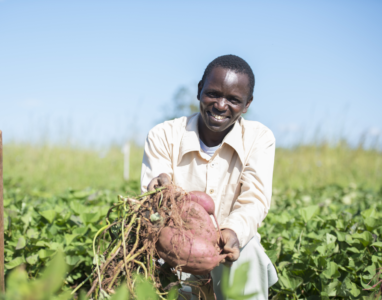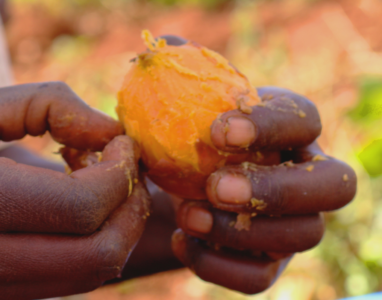 COVID-19 has presented many challenges to agriculture this year, but those challenges are also providing lessons that can be used to strengthen smallholder production.
COVID-19 has presented many challenges to agriculture this year, but those challenges are also providing lessons that can be used to strengthen smallholder production.
At a side event of Cultivate Africa, five CGIAR scientists sat down to discuss the specific ways that biofortification – increasing the nutritional value of crops through conventional breeding – can bolster nutrition and food systems, even during times of crisis. The event, sponsored by the African Union (AU), focused on finding innovative approaches for building partnerships to combat the effects of COVID-19 on food systems in Africa.
After introductory remarks by Paul Demo, the International Potato Center (CIP) Regional Director for Africa, Donald Mavindidze, HarvestPlus Regional Director for Africa, presented on the technology of biofortification. He told the audience that biofortification provides added nutrition at the point of production, through improved varieties of staple crops with essential micronutrients “built into” them. Because farmers save seeds from each harvest to plant in the next growing season, biofortification maintains the improved nutrition from one growing cycle to the next, as each harvest delivers vital vitamins and minerals without the expense of distributing supplements or fortified foods.
This quality is especially important during a pandemic, Mavindidze said, “because during crises like COVID-19, vulnerable communities default to staples and convenient food with substandard nutritional content. Biofortification ensures they still consume valuable vitamins.”

Moving from the general to the specific, Joyce Maru, Program Coordinator for CIP’s Global Sweetpotato Program, highlighted the potential of potato and sweetpotato in challenging situations. Citing recent examples of natural disaster in Ethiopia and Mozambique, Maru said that sweetpotato’s ability to mature quickly and grow well in challenging soil and weather conditions make it an invaluable crop for crisis response.
Iron-biofortified beans, on the other hand, not only reduce anemia but present exceptional opportunities to generate income along the value chain – from farmers to the market to the consumer. Jean Claude Rubyogo, a seed systems specialist with the Alliance of Bioversity and CIAT, said the cost savings that biofortified crops generate help sustain impoverished families who cannot work during COVID-19 or in the aftermath of natural disasters.
Animal-sourced foods are also essential, as Florence Mutua, a scientist with the International Livestock Research Institute, observed. Mutua described the nutritional role that livestock value chains can play in delivering important nutrients (such as iron, calcium and B12), during crises, and in forms that are available to the body. She also noted that the products need to be safe to ensure better health and nutritional outcomes.
The panel engaged in a lively roundtable discussion led by Liz Ogutu, a policy and advocacy officer for HarvestPlus. She asked the panel to identify ideas and actions that could “move the lever” in Africa to make biofortified crops accessible and affordable to all Africans. The panel unanimously endorsed the need for improved standards and guidelines for seed quality among all 55 states in the AU. This step, they agreed, should be part of a larger coordination platform in the AU to implement a framework to share biofortification research, indicators, and methods.
